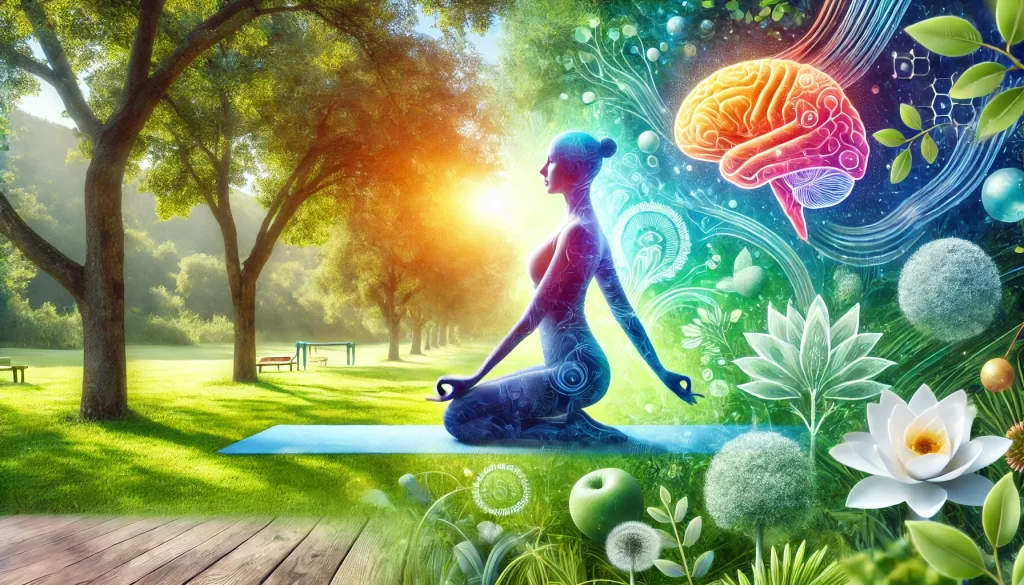Workouts can be considered a remedy to one’s mental health. Hence, they cure stress, anxiety, and depression. Meditation practices, coupled with mindfulness, would clean the mind and make it resilient. Now, most effective exercises are dealt with, coupled with techniques of meditation to achieve a better mental state.
Aerobic Exercise: Energize Your Mind
The various forms of aerobics like walking, jogging, and dancing reduce mental distress. These improve blood circulation to the brain and allow the release of happy chemicals. They also lower the levels of stress hormones.
1. Brisk Walking:
Brisk walking, even for half an hour, increases good mood and dispels anxiety. Even walking rejuvenates the mind.
Jogging/Running: Running at a slow pace increases fitness, and with that, it helps to fight against depression.
Dancing: Dancing to one’s favorite song does relieve the mood. It’s an amalgamation of physical exercise and fun.
Tips: All these activities should be performed every day, and a minimum of 150 minutes of moderate aerobic exercises should be done per week.
2. Muscle Gain:
Strength training for example bulks not only the muscles, but does a lot of wonders in fostering a good mental condition. Depression and anxiety signs and symptoms become reduced. Confidence with solidity becomes active on.
Body Weight Exercises: Simple exercises like push-ups and squats can be done at home.They build strength and improve mood.
Free weights and resistance bands involve the lifting of weights or a resistance band and can be confidence-enhancing because one gets the feeling of accomplishment.
Tip: Begin with just a couple of light sessions a week. Increase the weight or resistance progressively as you develop strength.

3. Yoga: Balance in Body and Mind
Yoga integrates physical movement with breathing and meditation. It is excellent for mental health since the levels of stress go down while clarity of the mind goes up.
Relaxation Poses: The simple yoga poses, including tree Pose, Cow Pose, and mountain pose, are really effective in reducing your stress by releasing tension from your muscles.
Pranayama and Breathing Exercises: Slow breathing has this potential to actuate the body’s response to relaxation, a state in which anxiety declines and calmness sets in.
TIP: Do yoga for at least 10–15 minutes everyday. Or take a yoga class.
4. Meditation
Meditation has been deemed a powerful implement of psychosocial fitness. It is said to be good, coupled with physical exercises, as it relaxes the mind and then focuses one’s attention on the present. Meditation decreases the levels of anxiety, depression, and stress.
Mindfulness meditation involves sitting quietly, keeping your focus on the breath, and if your mind wanders, you set it back gently. This may improve your concentration and make you less anxious and more at peace with yourself.
Guided Visualization: Visualize a peaceful place, such as a beach or forest. Picture yourself there, engaging all your senses to deepen the relaxation effect.
Tip: Start with just 5–10 minutes per day. Gradually work up to 20–30 minutes as you become more comfortable.
5. Stretching and Flexibility Exercises for the Relief of Stress
Flexibility activities are important for mental health, but are often neglected. Stretching eases muscle tightness, facilitates relaxation and enhances body consciousness.
Neck and Shoulder Stretches: These are great for individuals who work behind desks as they help relieve stress-induced physical stress. Full-Body Stretches: These include stretches of the legs, arms and back for effective relaxation and body flexibility.
Tip: Stretch as much as possible for approximately 5–10 minutes each, in the mornings and late evenings, as they have countless benefits for the physical and mental aspects of individuals.
Benefits of Physical Exercise and Meditation in a Single Session.
Incorporation of activity with meditation practices forms a holistic approach with regard to mental health. Physical activity builds the body and releases tension while meditation focuses the mind and strengthens it. When combined, they work in unison creating a multi-dimensional effect on mental focus, emotional control and overall quality of life.
Final Thoughts
Practice these every day; doing so will bring a great deal of change to your mental health: start small, enjoy what you’re doing, and remember, persistence is key. It could be a short session of meditation, a light stretch of yoga, or brisk walking in nature-the every step taken toward regular physical and mindful exercises leads to not just a healthier mind but a happier one.


